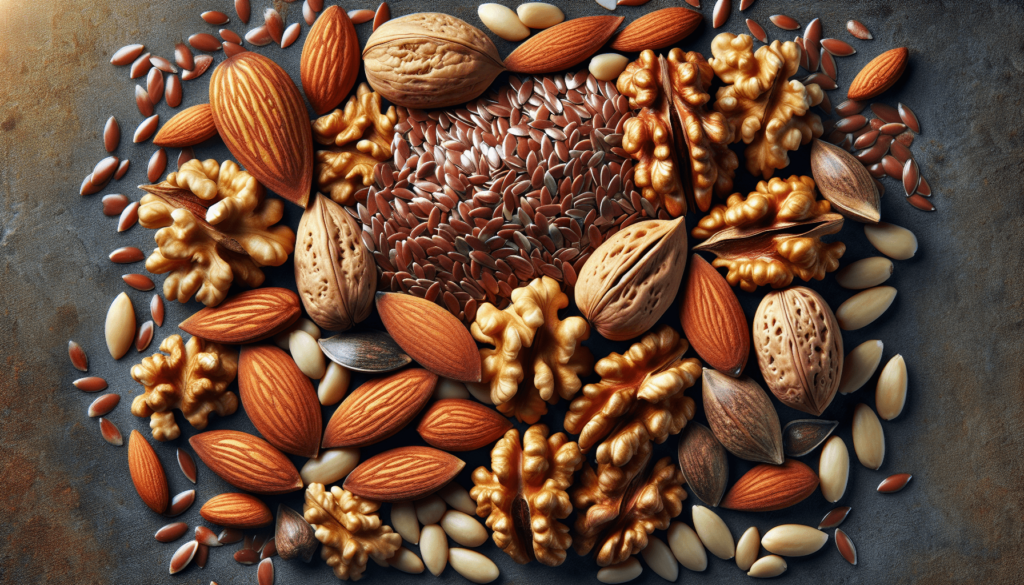Have you ever wondered how nuts and seeds can help keep your digestive system running smoothly? In this article, we’ll explore the fascinating role that these small but mighty snacks play in promoting regular bowel movements. From providing fiber to supporting gut health, you’ll discover the various ways in which nuts and seeds can contribute to a healthier digestive system. So, grab a handful of your favorite nuts and seeds, and let’s dive into the amazing benefits they offer for your bowel movements.
Fiber Content
High Fiber Content of Nuts and Seeds
Nuts and seeds are known for their high fiber content, making them an excellent addition to your diet when it comes to promoting regular bowel movements. Fiber is an essential nutrient that plays a crucial role in maintaining a healthy digestive system. It moves through the digestive tract, adding bulk to the stool and helping to prevent constipation. Nuts and seeds, such as almonds, chia seeds, and flaxseeds, are packed with dietary fiber, making them an ideal choice for individuals looking to improve their bowel regularity.
Soluble and Insoluble Fiber in Nuts and Seeds
It’s important to note that nuts and seeds contain both soluble and insoluble fiber, which contribute to their overall role in promoting regular bowel movements. Soluble fiber absorbs water in the digestive tract and forms a gel-like substance, making the stool softer and easier to pass. On the other hand, insoluble fiber adds bulk to the stool, helping to promote regular bowel movements. The combination of soluble and insoluble fiber in nuts and seeds makes them a versatile food option for maintaining a healthy digestive system.
Effect of Fiber on Bowel Movements
Fiber plays a significant role in regulating bowel movements by adding bulk and promoting regularity. When you consume a diet high in fiber from nuts and seeds, it helps to keep the stool soft and well-formed, reducing the likelihood of constipation. Additionally, fiber helps to stimulate the muscles in the intestines, promoting peristalsis, which is the wave-like movement that pushes the stool through the digestive system. By including nuts and seeds in your diet, you can ensure an adequate intake of fiber and support healthy bowel movements.
Hydration
Hydration and Bowel Movements
In addition to fiber, hydration also plays a crucial role in promoting regular bowel movements. When you are adequately hydrated, it helps to soften the stool, making it easier to pass through the digestive tract. When your body lacks proper hydration, the stool can become hard and difficult to pass, leading to constipation. Therefore, it is essential to maintain proper hydration by consuming an adequate amount of water throughout the day.
Importance of Adequate Hydration for Regularity
Ensuring you drink enough water each day is essential for maintaining regular bowel movements. When your body is properly hydrated, it helps to lubricate the intestines, facilitating the smooth movement of stool through the digestive tract. Adequate hydration also supports overall digestive health and helps to prevent complications such as constipation. To promote regularity and support a healthy digestive system, make sure to drink plenty of water and fluids throughout the day, especially when consuming a high-fiber diet that includes nuts and seeds.

This image is property of pixabay.com.
Gut Health
Prebiotic Properties of Nuts and Seeds
Nuts and seeds not only provide fiber but also offer prebiotic properties that promote a healthy gut. Prebiotics are a type of dietary fiber that cannot be digested by the human body but serves as nourishment for beneficial bacteria in the gut. Many nuts and seeds, such as walnuts and flaxseeds, contain prebiotics that help to support the growth and activity of the beneficial bacteria in the digestive system.
Effects of Prebiotics on Gut Microbiota
The gut microbiota, which refers to the trillions of microorganisms that reside in our intestines, plays a critical role in our overall health, including bowel movements. By consuming nuts and seeds with prebiotic properties, you are providing the necessary nourishment for the beneficial bacteria in your gut. This can help to improve the balance of gut microbiota, promoting a healthy digestive system and regular bowel movements.
Role of Gut Microbiota in Bowel Movements
The gut microbiota has a direct influence on bowel movements. It helps to break down food, absorb nutrients, and eliminate waste. When the gut microbiota is imbalanced, it can lead to digestive issues, including irregular bowel movements. By consuming nuts and seeds with prebiotic properties, you are supporting the growth and diversity of beneficial bacteria in your gut, which in turn promotes proper digestion and regular bowel movements.
Natural Laxatives
Nuts and Seeds as Natural Laxatives
Some nuts and seeds can act as natural laxatives, further aiding in promoting regular bowel movements. For example, almonds are known to have a mild laxative effect due to their fiber content. Similarly, chia seeds and flaxseeds can help to stimulate bowel movements and relieve constipation. These natural laxatives from nuts and seeds provide a gentle yet effective approach to supporting regularity in the digestive system.
Stimulating Bowel Movements
The high fiber content in nuts and seeds helps to stimulate bowel movements by adding bulk and promoting the natural contractions of the intestines. This increased muscle activity, known as peristalsis, helps to propel the stool through the digestive tract more efficiently. By consuming nuts and seeds regularly, you can help stimulate bowel movements and prevent constipation.
Enhancing Peristalsis
Peristalsis is the rhythmic contraction and relaxation of the muscles in the intestines that propels the stool forward. Nuts and seeds, with their high fiber content, can enhance peristalsis, ensuring smooth and regular bowel movements. The fiber in nuts and seeds adds bulk to the stool, providing the necessary triggers for peristalsis to occur effectively. By incorporating nuts and seeds into your diet, you can aid in enhancing peristalsis and promoting regular bowel movements.

This image is property of pixabay.com.
Essential Nutrients
Nutritional Composition of Nuts and Seeds
Nuts and seeds are not only rich in fiber but also contain a wide range of essential nutrients that support digestive health. They are excellent sources of vitamins, minerals, and antioxidants that contribute to overall well-being. Almonds, for example, provide vitamin E and magnesium, while pumpkin seeds are packed with zinc and omega-3 fatty acids. By consuming a variety of nuts and seeds, you can ensure a diverse intake of essential nutrients that are beneficial for your digestive system.
Vitamins and Minerals Supporting Digestive Health
Several vitamins and minerals found in nuts and seeds play a crucial role in supporting digestive health. Vitamin E, commonly found in almonds, acts as an antioxidant and helps protect the digestive system from damage. Magnesium, another nutrient abundant in nuts and seeds, helps to relax the muscles in the intestines, promoting proper bowel movements. Zinc, which is present in pumpkin seeds, aids in the repair and healing of the digestive system. By incorporating nuts and seeds into your diet, you can provide your body with the necessary vitamins and minerals for optimal digestive health.
Omega-3 Fatty Acids
Role of Omega-3 Fatty Acids in Bowel Movements
Omega-3 fatty acids, which are found in certain nuts and seeds, play a vital role in promoting regular bowel movements. These healthy fats help to reduce inflammation in the digestive system, which can otherwise impede the proper functioning of the intestines. By including omega-3-rich nuts and seeds like walnuts and flaxseeds in your diet, you can help to alleviate inflammation and maintain healthy bowel movements.
Reducing Inflammation
Inflammation in the digestive system can lead to discomfort and irregular bowel movements. Omega-3 fatty acids, present in walnuts and flaxseeds, have anti-inflammatory properties that help to reduce inflammation in the gut. By incorporating these nuts and seeds into your diet, you can help alleviate inflammation and promote regular bowel movements.
Lubricating Stool
Omega-3 fatty acids also play a role in lubricating the stool, making it easier to pass through the digestive system. This lubrication helps to prevent constipation and supports regular bowel movements. Walnuts and flaxseeds, which are rich in omega-3 fatty acids, can be a valuable addition to your diet when it comes to maintaining bowel regularity.

This image is property of pixabay.com.
Antioxidants
Antioxidants in Nuts and Seeds
Nuts and seeds are abundant in antioxidants, which help to protect the digestive system from oxidative stress. Oxidative stress occurs when there is an imbalance between antioxidants and harmful free radicals in the body. By consuming nuts and seeds with their antioxidant properties, you can help to reduce oxidative stress in the digestive system and promote a healthy bowel.
Reducing Oxidative Stress
Oxidative stress can impair the proper functioning of the digestive system and contribute to irregular bowel movements. Antioxidants, such as vitamin E found in almonds, help to neutralize free radicals and reduce oxidative stress. By incorporating nuts and seeds into your diet, you can provide your digestive system with the necessary antioxidants to maintain its health and regularity.
Protecting the Digestive System
The digestive system can be vulnerable to damage from various factors, including inflammation and oxidative stress. Antioxidants found in nuts and seeds help to protect the digestive system from such damage, ensuring its proper functioning. By including nuts and seeds in your diet, you can provide your body with the necessary antioxidants to support a healthy digestive system and regular bowel movements.
Weight Management
Impact of Nuts and Seeds on Weight Management
Nuts and seeds can play a significant role in weight management, which in turn can influence bowel movements. These foods are nutrient-dense and provide a satisfying feeling of fullness, which can help control appetite and prevent overeating. Incorporating nuts and seeds into your diet can contribute to maintaining a healthy weight, reducing the risk of obesity-related constipation.
Preventing Obesity-Related Constipation
Obesity is a risk factor for constipation and irregular bowel movements. By including nuts and seeds in your diet as part of a balanced approach to weight management, you can help prevent obesity-related constipation. Nuts and seeds provide a healthy source of fats, fiber, and other essential nutrients, promoting regular bowel movements and supporting overall digestive health.

Phytosterols
Phytosterols in Nuts and Seeds
Nuts and seeds are also a rich source of phytosterols, which are plant compounds that have been shown to have various health benefits. These phytosterols, including beta-sitosterol and campesterol, have been linked to a reduction in cholesterol levels and can also promote digestive health. By consuming nuts and seeds that contain phytosterols, such as almonds and pumpkin seeds, you can support both your cardiovascular health and your digestive system.
Lowering Cholesterol and Promoting Digestive Health
Phytosterols, found in nuts and seeds like almonds and pumpkin seeds, have been shown to lower cholesterol levels. High cholesterol can negatively impact bowel movements and overall digestive health. By incorporating nuts and seeds into your diet, you can help to lower cholesterol levels and promote a healthy digestive system.
Tips and Recommendations
Incorporating Nuts and Seeds into Your Diet
To maximize the benefits of nuts and seeds for promoting regular bowel movements, it’s important to incorporate them into your regular diet. You can snack on a handful of almonds or pumpkin seeds, sprinkle chia seeds or flaxseeds onto your breakfast cereal or yogurt, or add nuts and seeds into your salads or homemade granola bars. Experiment with different nuts and seeds to find your favorite combinations and enjoy the health benefits they provide.
Portion Sizes and Moderation
Although nuts and seeds offer numerous health benefits, it’s important to consume them in moderation due to their high calorie and fat content. While they are nutrient-dense, they can still contribute to weight gain if eaten in excessive amounts. Stick to recommended portion sizes, which typically range from a small handful to a quarter cup, depending on the specific nut or seed. Incorporate a variety of nuts and seeds into your diet to obtain a diverse array of nutrients.
Choosing the Right Nuts and Seeds
When incorporating nuts and seeds into your diet, it’s important to choose the right ones that align with your dietary needs and preferences. Opt for unsalted nuts and seeds to avoid excessive sodium intake. If you have allergies or sensitivities, be mindful of the specific nuts or seeds you choose. Additionally, consider factors such as taste, texture, and versatility when selecting nuts and seeds to ensure an enjoyable and sustainable dietary habit.
By understanding the role that nuts and seeds play in promoting regular bowel movements, you can make informed choices about incorporating them into your diet. Whether you’re looking to increase your fiber intake, support gut health, or manage your weight, nuts and seeds offer a wide range of benefits for your digestive system. With their high fiber content, essential nutrients, and other advantageous properties, nuts and seeds are a versatile and delicious addition to a healthy, well-rounded diet. So go ahead and enjoy a handful of nature’s bounty to support your digestive health and promote regular bowel movements.


